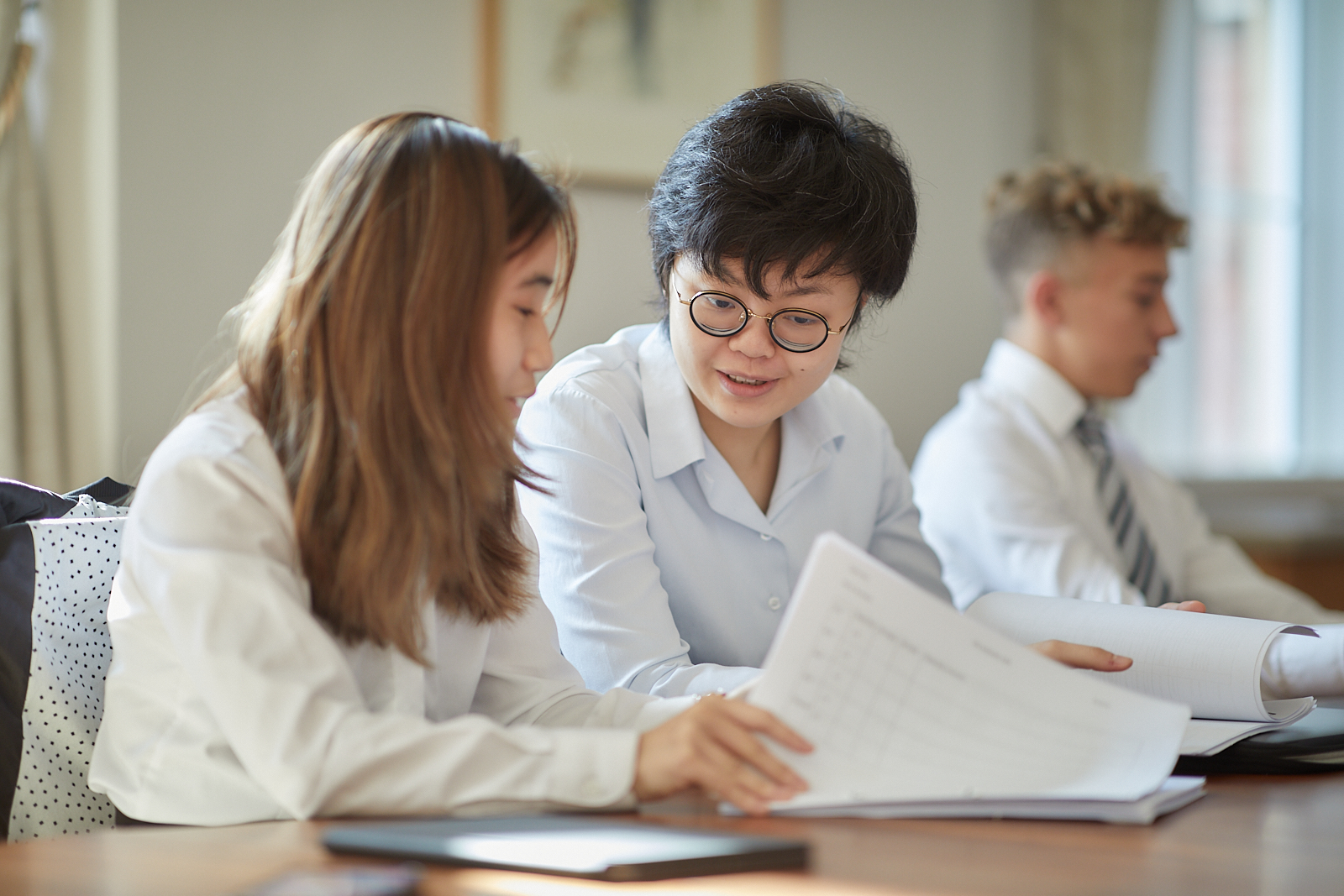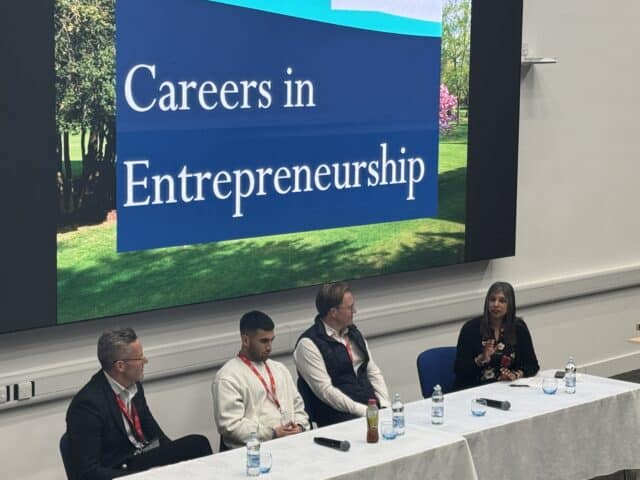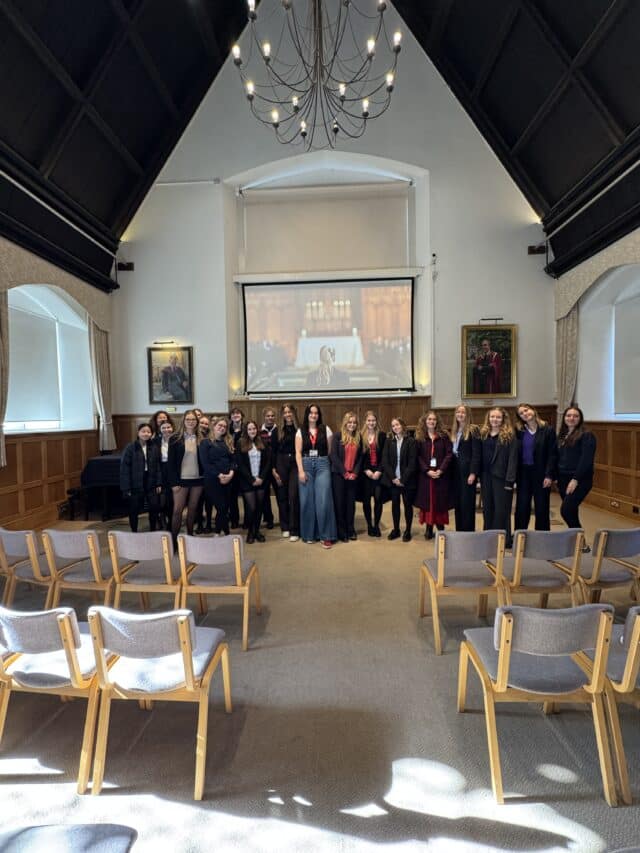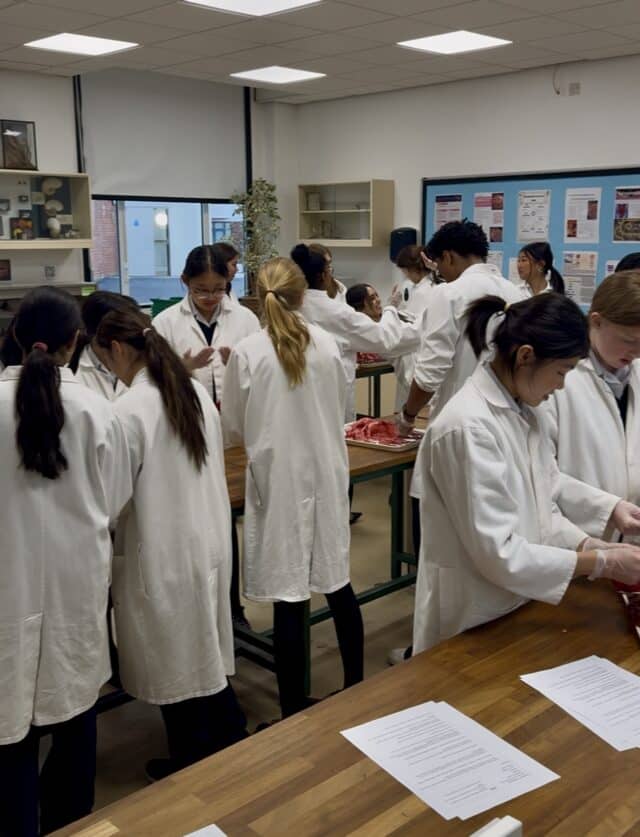We are delighted to celebrate the exceptional range of impressive Extended Projects submitted by the current Upper Sixth year group. For the EPQ, students must hone a research question, conduct university-level research, and plan, manage and write an analytical report (or, alternatively, plan and create an artefact of their choosing.) This year, there was a truly wide and intellectual range of projects, including 5000-word investigative reports and artefacts.
Many successful and creative artefacts were submitted as well, from the creation of a Theatre in Education on gender-based violence (Kaycee Padayachy M) to a three-song original EP (Maddie Fairbank M) to a musical re-scoring of classic Science Fiction scenes (Raffi Harley Fa) to a design for a sustainable wedding dress in the style of past English Royal wedding dresses (Mia Smiley Rv).
Pictured are a selection of students from the 2021 cohort with their outstanding projects:
Jamie Taylor (P): ‘Do advanced post-exercise recovery methods benefit an athlete more than basic post-exercise recovery methods?’ (report)
Scarlett Walker (R): ‘Is 21st-century society ‘dystopian’? Using elements from the novels ‘1984’ by George Orwell and ‘Brave New World’ by Aldous Huxley as a defining set of criteria for comparison, an evaluation of how far 21st-century society can be defined as ‘dystopian’.’ (report)
Isa Cheng (W): ‘Is clean liquid hydrogen combustion the future of commercial aviation?’ (report)
Muvis Hui (Cr): ‘A design proposal that suggests a new model of government social housing for single residents.’ (artefact – architectural designs)
Kameron Padayachy: ‘Should cannabis oil have been legalised in medicine in the context of the premise that it exacerbates mental health disorders such as anxiety and schizophrenia? An evaluation into the effectiveness of cannabis oil in managing the symptoms of epilepsy, multiple sclerosis and chemotherapy, and its effects on mental illnesses.’ (report)
Ellie Jordan (M): ‘To what extent has the UK government infringed on its population’s civil liberties during the Covid-19 pandemic during 2020? With reference to the political philosophers John Stuart Mill and Thomas Hobbes.’ (report)
Seb Ward (P): ‘What makes a bicycle stable? An evaluation of theories about, and experiments into, bicycle stability and the implications for how geometry can be further changed to improve bicycle design and performance.’ (report)
Other exceptional projects from this talented cohort include:
Jude Clark (G): ‘To what extent are the brains of rugby players damaged due to Traumatic Brain Injuries, specifically concussion, and how can they be prevented to reduce subsequent retirements?’ (report)
Annabelle McGuinness (Cr): ‘To what extent did Hong Kong’s colonisation and mass immigration generate a financial centre between the period of 1950 to 1997?’ (report)
Maddie Fairbank (M): ‘Write and produce an EP to convey the development of emotions during the end of a relationship, with objectives to relate to personal experiences of teenage girls, drawing on musical characteristics from the genres of pop and R&B.’ (artefact – Three Song EP)
Eva Saunders (M): ‘In what ways can the three established theories of criminology be applied in analysing the violent criminal behaviour of a serial killer?’ (report)
Ed Stainthorpe (Rn): ‘What was the most significant reason why the Great Depression ended in the USA? An evaluation of how and why the New Deal and the economic policy and impact of World War Two on the USA stimulated economic recovery and which reason was more significant?’ (report)
Nicole Farmer (R): ‘When are behavioural nudges employed by governments most effective at influencing people’s behaviour?’ (report)
Jess Alexander (Rv): ‘What is the main psychological cause of anorexia nervosa in adolescents?’ (report)
Ruby Aragi (R): ‘Should graffiti be considered art or vandalism? A study into the differences between the two and what causes some graffiti to be classed as vandalism’ (report)
Alessia Boot (R): ‘Should defendants in rape and sexual assault cases be entitled to anonymity? And up to what stage, charge, or conviction, would the defendant be entitled to this anonymity?’ (report)
Solomon Ekoku (Fa): ‘The music and the musicians: An evaluation into the role played by popular African American musicians and their music in impacting the Civil Rights Movement from 1950 to 1970 in the USA.’ (report)
Hollie Gard (R): ‘To what extent do counterterrorism measures infringe upon privacy? Is this morally justifiable?’ (report)
Heidi Cheng (M): ‘The design and creation of a mobile application for the iPhone focusing on underrated historical places, promoting the history of Hong Kong to Western tourists.’ (artefact – travel app)
Raffi Harley (Fa): ‘A digital re-scoring of four classic Sci-Fi scenes.’ (artefact – musical score)
Kate Collie (M): ‘To what extent do the laws in Saudi Arabia and Hungary impact the civil and political liberties of the people in each respective country?’ (report)
Jade Ho (Cr): ‘An analysis of whether cultured meat would become the new era in the next 30 years, based on comparisons against conventional meat production.’ (report)
Audrey Zhao (W): ‘An investigation and comparative analysis of COVID-19 prevention and control measures enacted by the British and Chinese governments; what can they learn from each other’s approach?’ (report)
Barney Fildes (P): ‘How significantly can music and music therapy impact people with Alzheimer’s and related progressive brain disorders when compared to other related therapies? A study of the neurological effects of music’ (report)
Riya Treohan (M): ‘What is the most effective psychotherapeutic treatment for curing a phobia out of Cognitive Behavioural therapy and hypnotherapy? Using acrophobia as a case study.’ (report)
Congratulations to all students who completed an EPQ this year. It is truly an accomplishment to be proud of.





